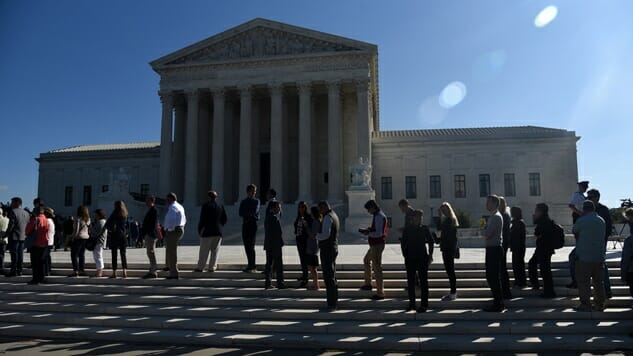On Wednesday, the Supreme Court heard arguments in the latest in a sequence of abortion cases that could have far-reaching ramifications for state legislatures’ ability to restrict abortion access.
The case, June Medical Services LLC v. Russo (Stephen Russo, Interim Secretary of the Louisiana Department of Health and Human Services), concerns a Louisiana law requiring doctors who perform abortions to have admitting privileges at a hospital within 30 miles of the clinic at which the abortion is performed.
Since 2011, nine states have passed “admitting privileges” restrictions of this kind. In 2016, the Supreme Court struck down one such Texas law, ruling it an undue burden on a patient’s right to seek an abortion. Their point is well taken; after the enactment of the law, over half of Texas abortion clinics closed.
A federal judge found that the law would close two of Louisiana’s three abortion clinics.
Admitting Privileges
Admitting privileges are exactly what they sound like: a physician’s ability to check their patients into a hospital and provide care there.
It sounds like a perfectly reasonable thing to ask of abortion providers, but is a prototypical example of what abortion rights activists call “TRAP” laws, “targeted restrictions on abortion providers,” the implication being that such laws appear to make abortion safer, but in actuality do nothing for or in fact jeopardize patient health.
Admitting privileges don’t change much for a patient’s care. Without them, if a patient experienced complications during an abortion, they could check into their nearby hospital of choice and receive care from doctors communicating with the abortion provider, whereas a doctor with privileges would check the patient into their designated hospital. In fact, for a number of logistical reasons, the days of admitting privileges are becoming obsolete.
Not to mention, abortions rarely manifest serious complications that would warrant a hospital visit.
Admitting privileges are also very often a cover for targeting abortion providers. In hopes of avoiding controversy, some hospitals will reject abortion providers altogether. Doctors at the last abortion clinic open in Mississippi applied for privileges at seven nearby hospitals and were rejected at all of them.
Politics or Precedent
With precedent established as recently as 2016, the question now is whether Chief Justice and Court swing vote John Roberts’ respect for precedent and occasionally liberal leanings or allegiance to his usually conservative values and fellow Justices will prevail.
Roberts voted with the four liberal Justices to put a hold on the Louisiana law when it went into effect a year ago, halting its enforcement and bringing it to court, but in his 14 years as Chief Justice, he’s often upheld abortion restrictions.
However, Roberts has very recently signaled greater respect for precedent than politics, asking during a different case this week when determining whether a 10-year-old decision could help determine the case, “Do you think that recent precedent should have a binding effect on how the court addresses this case?”
In this case, that may mean Roberts would defer to the rulings from 1973’s Roe v. Wade and that 2016 Texas case to strike down the Louisiana law.
Roberts also seemed unsympathetic to Wednesday’s arguments from Louisiana Solicitor General Elizabeth Murrill, as well as conservative Justices Brett Kavanaugh and Samuel Alito.
In his argument, Alito folded into this case an attack on “third-party standing,” which in this arena regards June Medical’s right to file on behalf of abortion seekers to begin with. Alito argued against third party rights—Roberts seemed unswayed by that line of reasoning, but if Alito pushes the point further, it could spell disaster for abortion rights advocates. Abortion providers, not people seeking abortions, file the vast majority of challenges to abortion restrictions.
The Battle and the War
Attacks on third-party filing rights and admitting privileges are some of an array of tactics abortion rights opponents are using in nationwide efforts to chip away at Roe v. Wade.
TRAP laws have sprung up in state legislatures across the country in recent years, with Alabama’s governor signing a law banning abortion entirely (except if the mother’s health is at stake), Georgia, Louisiana and Ohio passing heartbeat bills, and states across the nation passing legislation restricting the window in which abortion is legal.
Most of those laws are brought to court, and many have made their way up into federal courts and, as in the case of June Medical, to the Supreme Court, where a decision in their favor could green-light abortion restrictions nationwide. That could amount to a piecemeal reversal of Roe v. Wade.
“What they would be doing is gutting it so much and creating the right template for state legislatures to then follow suit and then opening up those floodgates,” Alexis McGill Johnson, acting president of the Planned Parenthood Action Fund, said.
At the Supreme Court level, Justice Clarence Thomas has been clear about his intention to outright overturn Roe v. Wade, saying, “We cannot continue blinking the reality of what this court has wrought.”
With Trump’s firmly conservative two appointees, Kavanaugh and Neil Gorsuch, joining Thomas and Alito on the bench in recent years, the outcome in this and future abortion rights cases comes down to Chief Justice Roberts.
We’ll get a decision on June Medical LLC v. Russo by late June.
